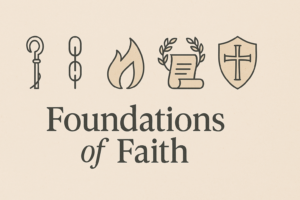
Have you ever felt like life is spinning out of control? One moment, everything seems fine; the next, you’re hit with a crisis that shakes you to your core. It could be a sudden job loss, a heartbreaking diagnosis, or an unexpected betrayal. In those moments, we grasp for stability, trying desperately to make sense of the chaos.
But what if real peace isn’t found in controlling our circumstances, but in trusting the One who does?
Life often feels like a whirlwind—plans change without warning, hardships appear out of nowhere, and the future seems uncertain. Maybe you’ve felt like no matter how hard you try to plan, things just don’t go your way. These moments—job loss, health crises, strained relationships—can make you wonder: Who is really in control?
1. What Is God’s Sovereignty?
God’s sovereignty means He reigns supreme over all creation. He is not a passive observer but an active ruler. The Bible affirms this truth:
Daniel 4:35 – “All the inhabitants of the earth are accounted as nothing, and He does according to His will among the host of heaven.”
This verse emphasizes God’s supreme authority. Nothing happens outside His control, and no one can override His plans. Believers can rest in the knowledge that their lives aren’t left to chance.
Proverbs 16:9 – “The heart of man plans his way, but the Lord establishes his steps.”
We may form our own plans, but God ultimately determines what unfolds. Even when life doesn’t go as expected, we can trust that He is working behind the scenes for His glory and our good.
Romans 8:28 – “And we know that for those who love God all things work together for good.”
This assures us that God uses every situation—good or bad—to shape us according to His purpose. It doesn’t guarantee an easy life, but it promises purpose and peace in hardship.
2. Why Understanding God’s Sovereignty Matters
- It brings peace in uncertain times. Life can change without warning—through job loss, illness, or tragedy. Knowing that God is sovereign reminds us nothing surprises Him. This truth calms our anxieties, even in the worst of times.
- It encourages trust in God’s plan. If we believe God is truly in control, we can release our fear of the unknown. We don’t need to force outcomes; instead, we trust His wisdom and love as He guides our path.
- It helps us submit to His will joyfully. We often resist God’s will because we don’t understand it or it conflicts with our desires. Recognizing His sovereignty teaches us to see trials as opportunities to grow, rather than as obstacles to happiness.
3. How God’s Sovereignty Works in Daily Life
In our decisions (James 4:13-15)
We are encouraged to plan, but always with humility, knowing God’s will prevails. James warns us not to boast about tomorrow because only God knows what it will bring. We should submit our plans to Him, acknowledging His final authority.
In suffering and trials (Job 42:2, Romans 5:3-5)
Job’s story shows that suffering fits into God’s sovereign plan. Even after losing everything, Job acknowledged that nothing can thwart God’s purposes. Romans adds that suffering produces endurance and strengthens our character. Hardships do not mean God is absent; they are part of His refining work.
In our spiritual growth (Philippians 1:6)
Spiritual growth is no accident. Philippians 1:6 promises that God, who began a good work in us, will bring it to completion. He actively shapes us into Christ’s image, ensuring our sanctification unfolds according to His plan.
4. Common Misconceptions About Sovereignty
Does sovereignty mean we have no free will?
No. God’s sovereignty and human responsibility coexist. We make real choices, yet God works through them to accomplish His will. Joseph’s story in Genesis shows this: his brothers intended harm, but God used their actions for ultimate good.
Is God responsible for evil?
While God allows evil, He is not its author. He is holy and righteous, incapable of sin. He often uses even sinful human actions to fulfill His greater purposes. The crucifixion of Christ is a powerful example: human evil resulted in salvation for many.
Does sovereignty remove human responsibility?
Not at all. We are still called to live obediently and wisely. God’s control does not excuse laziness or apathy; rather, it motivates us to be diligent and faithful.
5. Living in Light of God’s Sovereignty
Developing a mindset of trust.
Trust in God’s sovereignty is a discipline. It grows through daily surrender, prayer, and focusing on Scripture. Reflecting on God’s past faithfulness boosts our confidence in His guidance for the future.
Praying with confidence (Matthew 6:10).
Jesus taught us to pray, “Your will be done,” which shows trust in God’s plan. When we align our prayers with His perfect will, we stop trying to force our own agenda.
Responding to hardships with faith.
Hardships are unavoidable, but how we respond reveals our trust in God’s sovereignty. Instead of losing hope, we can rejoice that each trial is shaping us, strengthening our reliance on Him.
Summary
God is fully in control of all things.
Trusting in His sovereignty brings peace, confidence, and hope.
Our response should be faith, prayer, and submission to His will.
Do you struggle with trusting God’s sovereignty? Share your thoughts in the comments. If this post encouraged you, consider passing it along to someone who needs to hear this truth. Subscribe for more biblical insights on living faithfully in a chaotic world.



